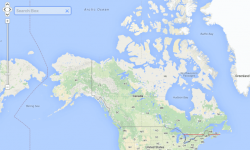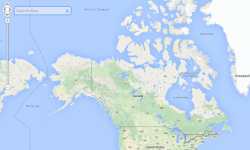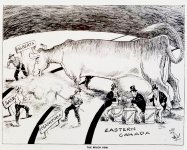- Reaction score
- 6,167
- Points
- 1,260
Remember 1832? The Great Reform Act, the birth of modern liberalism (the small "L" really, really matters)? All that?
Small L liberal democracy is neither old new especially robust. Some forms of illiberal democracy have been around for a long time, since, arguably, the Athenian agora, but the whole idea of liberalism - where the individual is sovereign and all rights belong, equally, to each sovereign individual, regardless of race, creed, sex, etc, is quite new - starting, maybe, in Iceland about 1,000 years ago and not really flourishing until Britain in the 19th century.
Anyway, 1832, the Reform Act, brought us the idea of "one man-one vote," which, quickly spread to America and even to Canada, where it was opposed by the rich and powerful in Toronto, Charlottetown and Halifax and especially in Montreal and Québec City.
But the 1860s, when the British contemplated casting Canada adrift, was the time of Palmerston, Smith-Stanley and Russel and saw the rise of Disraeli and Gladstone. In 1867, besides granting Canada a form of sovereignty, Smith-Stanley, the Earl of Derby, also passed another Reform Act and cemented liberalism into Anglo-American political culture where it resides, not always securely, today.
Anyway, the notion that each person should have a roughly equal say in deciding who gets to govern us all is a major liberal democratic value. Those of us who call ourselves liberals believe that we should all have a nearly equal say - yes, there is a need for regional representation and that explains why Nunavut gets one MP but there is no valid democratic excuse for PEI's four seats; it is a Constitutional anomaly and highlights the nonsense that we find in all written constitutions.
The people of rural Saskatchewan have no inherent right to extra representation just because they live in a rural area. Their fundamental right is to live where and (broadly) how they wish, they do not get rewarded, politically, for that choice. Equally the people in, e.g. Calgary and Toronto do not deserve to be underrepresented, just because they live in cities, do they?
This map matters - more than half of all Canadians live South of the red line. They deserve more than half of the seats in the House of Commons, don't they? (The Senate is a whole different matter, related more to federalism and to democracy.)
Small L liberal democracy is neither old new especially robust. Some forms of illiberal democracy have been around for a long time, since, arguably, the Athenian agora, but the whole idea of liberalism - where the individual is sovereign and all rights belong, equally, to each sovereign individual, regardless of race, creed, sex, etc, is quite new - starting, maybe, in Iceland about 1,000 years ago and not really flourishing until Britain in the 19th century.
Anyway, 1832, the Reform Act, brought us the idea of "one man-one vote," which, quickly spread to America and even to Canada, where it was opposed by the rich and powerful in Toronto, Charlottetown and Halifax and especially in Montreal and Québec City.
But the 1860s, when the British contemplated casting Canada adrift, was the time of Palmerston, Smith-Stanley and Russel and saw the rise of Disraeli and Gladstone. In 1867, besides granting Canada a form of sovereignty, Smith-Stanley, the Earl of Derby, also passed another Reform Act and cemented liberalism into Anglo-American political culture where it resides, not always securely, today.
Anyway, the notion that each person should have a roughly equal say in deciding who gets to govern us all is a major liberal democratic value. Those of us who call ourselves liberals believe that we should all have a nearly equal say - yes, there is a need for regional representation and that explains why Nunavut gets one MP but there is no valid democratic excuse for PEI's four seats; it is a Constitutional anomaly and highlights the nonsense that we find in all written constitutions.
The people of rural Saskatchewan have no inherent right to extra representation just because they live in a rural area. Their fundamental right is to live where and (broadly) how they wish, they do not get rewarded, politically, for that choice. Equally the people in, e.g. Calgary and Toronto do not deserve to be underrepresented, just because they live in cities, do they?
This map matters - more than half of all Canadians live South of the red line. They deserve more than half of the seats in the House of Commons, don't they? (The Senate is a whole different matter, related more to federalism and to democracy.)




